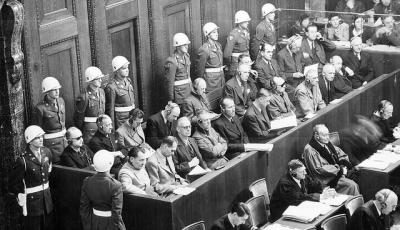Juxtaposing a Personal Tale and the Contemporary Global Justice System 70 years after Auschwitz
Posted:
Time to read:

Höβ became a key witness in the Nuremberg trials and a defendant in his own trial held in Warsaw in 1947. At Nuremberg, Höβ became the first witness to admit the deliberate extermination plan, the final solution, that had been devised by the Nazi bureaucracy and that he personally had diligently implemented and perfected. In his statement he estimated that under his command two and a half million people had been exterminated and another half million had succumbed due to starvation and diseases. His testimony was the first account of a top Nazi Commander who admitted to the horrors of Auschwitz and as such directly implicated a number of individuals who, above and below his rank, had contributed to the functioning of the extermination machinery. Later on, in 1947, after a two-week trial, Höβ was sentenced to death by hanging, which took place at Auschwitz, not far from the villa where he had lived with his family for many years and not far from the office in which he had worked. Captain Alexander, who had spent much time combing through a war-torn Germany to bring some key individuals to justice, terminated his duty soon after Höβ’ capture and left Germany promising to never return. And so he did.

Firstly, the International Criminal Court (ICC) was built, metaphorically speaking, on the monument of Nuremberg and as a tribute to the ashes of Auschwitz. The ethos of this project derives directly from the post-WW2 spirit that wanted the atrocities of Auschwitz avenged. More than 50 years later, in 1998, at the Rome Conference Kofi Annan, then Secretary General of the United Nations, directly linked the creation of the ICC to the shocking events of Auschwitz: ‘With the use of weapons of mass destruction and the application of industrial technology to dispose of millions of human beings, the world had come to realize that relying on each State or army to punish its own transgressors was not enough.’
While such large-scale industrial machinery of mass destruction may remain a unique dark episode in mankind’s history, mass violence and genocide are still a reality of today’s world. Recent events such as those in Rwanda, Ex-Yugoslavia, Cambodia, Iraq and Syria, to name a few, are proof of it. They represent, together with Auschwitz and many others, the reason why the ICC was established. 70 years later, we may have moved on from Auschwitz, but these events as well as the creation of the ICC prove that there is a continuous belief in the validity of trials as an appropriate response to mass atrocities. Indeed the ICC, despite all founded and unfounded criticism it receives, is very active in examining, investigating and prosecuting cases in a number of situations of recent times. In turn, while the ICC may be in some way a contemporary, more inclusive and ‘modern’ version of Nuremberg - 123 states are members of it against the 4 that established Nuremberg - the challenges that it faces today may be not dissimilar from those faced by its predecessor in the aftermath of Auschwitz. This poses a serious question about the effects and functions of international criminal trials as methods to establish post-conflict justice, then and now.

Thirdly, selectivity, victors’ justice, expediency may have all been part and parcel of the efforts to bring justice for the crimes of Auschwitz at different times in history. Indeed, later in his life Captain Alexander lamented: ‘The number of murderers I had to dismiss made me sick. They made fools out of us. You know, the Russians were more efficient. When they heard such stories they found the accused and shot them. We could not do it. We did not do it.’ 70 years on, the ICC, faces similar accusations of bias, selectivity and, of being a court of the powerful against the weak. While these accusations may not be unfounded, the very existence of the ICC is also evidence of the victory of an approach to post-conflict justice based on the search for evidence, truth and the application of human rights standards to both victims and accused. At the same time, however, just like in the Nuremberg and Höβ’ trials, the ICC faces continuous conundrums on how to deal with state officials, i.e. the powerful, who committed international crimes against the weak. The Kenya and Sudan cases are examples of this in the recent times.
This list is far from exhaustive, but on the eve of the 70th Anniversary of Auschwitz’s liberation, it was worth recalling that Auschwitz is very much part of the institutional memory of the newest institution that was set up to bring justice in light of contemporary and future mass atrocities through international trials. It is, even more so, what symbolically drives its mission, just as at the time it drove Captain Alexander’s pursuit of Rudolf Höβ. The history narrated in ‘Hanns and Rudolf’, is a further reminder of this continuum and a book which I thoroughly recommend.
About the Author: Matilde's research analyses issues of international criminal law and post-conflict justice, with a particular focus on the role of the ICC in Uganda. She is the student chair of Oxford Transitional Justice Research (OTJR).
Keywords:
Share:
